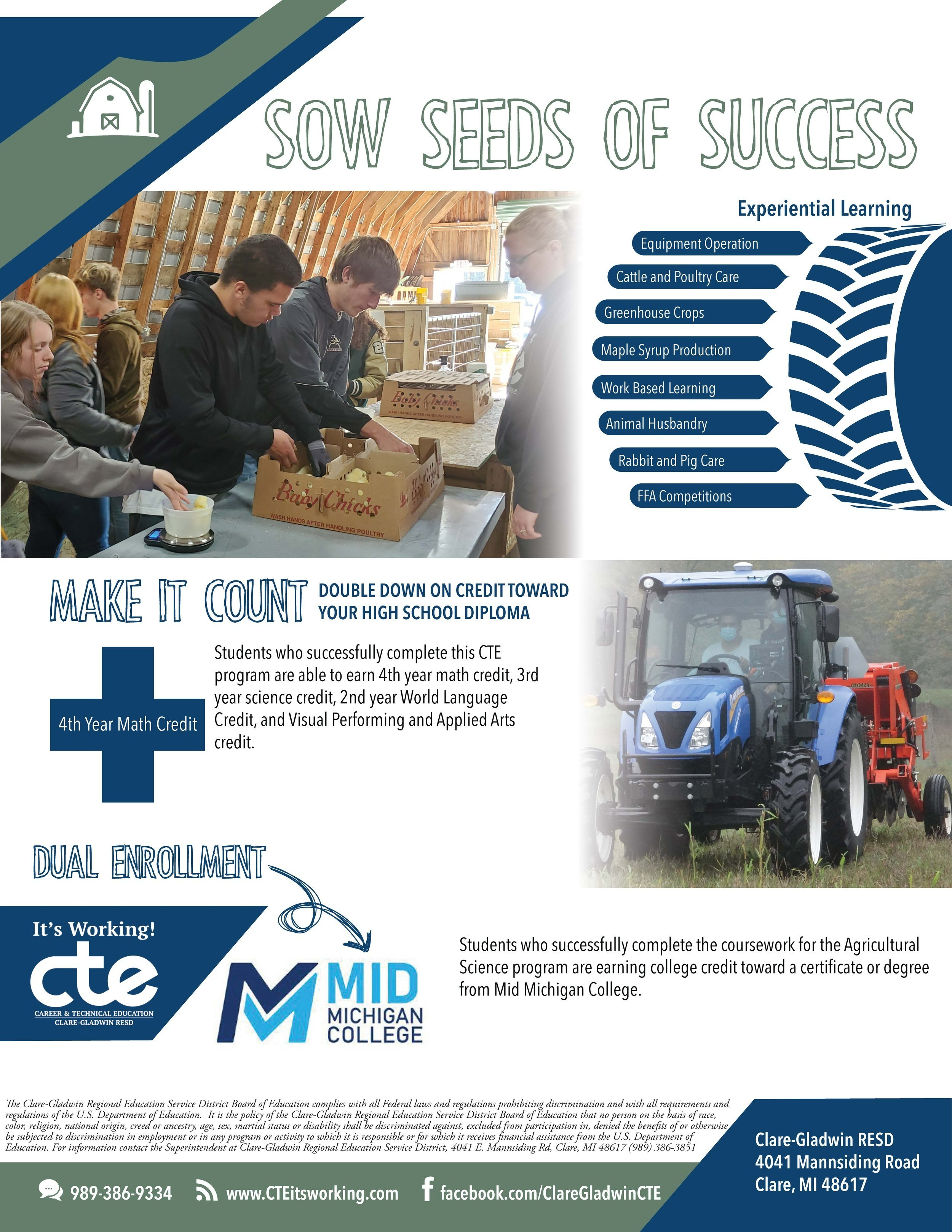Sow the seeds of success and grow a great career.
Agri-Science students actively participate in classroom and laboratory activities involving environmental and natural resources, animal and plant systems and agri-business. Topics covered include career opportunities, safety, technology applications, agri-business leadership, environmental science, soil science, plant science, forestry, animal science, aquaculture, wildlife science, pest management and more.
Course Overview
Agri-Science prepares students for a wide variety of careers in agriculture and animal science. Specific areas of study include Plant/Soil Science, Veterinary Science, Agricultural Business Management, Farm Mechanics, Leadership in Agriculture and Greenhouse/Landscape Management. Class work is supplemented by hands-on experience in on-site laboratories, as well as field trips to area farms and businesses.
Course content includes Scientific and Social Implications of Agri-Science; Leadership, Business Education & Career Success; Organization of Living Systems; Animal Industries and Domestic Animal Production; Comparative Animal Systems and Animal Genetics; Animal Health and Nutrition; Plant Physiology; Plant Nutrition; Pests and Pest Management; Soils; Environmental and Energy Systems; and Natural Resources Fundamentals.
Special class features include real-world experience and Work-Based Learning opportunities.
Employment skills for the future include self-directed participation; leadership; teamwork; and critical thinking and problem-solving.
Learning Environment
Time is spent in the classroom and in the Agri-Science lab learning to safely operate equipment. Studying agriculture means that you’ll be working in an important industry that is both considered to be fast-moving and high-tech. Courses in animal science, food production, horticulture, property management and environmental preservation
are all areas explored within agriculture.
Is it for me?
It is if you…
...are good at math and science
...work well with a team or individually
...are self-directed
...love animals
...are interested in the environment
...are good at problem solving
...want to build your leadership skills
Potential Careers
Participation in Agri-Science can help prepare you for jobs in areas like:
Veterinarian/Vet. Assistant
Horticulturist
Agriculture Equipment Operator
Truck Driver
Conservation Officer
Agricultural Lawyer
Agriculture Retail Sales Representative
Agribusiness Operations Manager
Agri-Science Teacher
Custom Applicator/Pest Control
Farm Manager
Agricultural Finance/Accountant
Agriculture Technician
Food Scientist
Water Quality Specialist
What’s It Like?
Instructor Tony Wood says: “This course will examine a wide variety of aspects and careers in agriculture. Topics will be discussed and explored in the classroom, but much of the course will comprise of students applying what they learn in real world hands-on activities. You should expect to grow plants and care for animals in this class. By enrolling in this course, you will automatically become a member of FFA. The goal of the organization is to ‘develop premier leadership, personal growth and career success through agriculture education.’ Through FFA, you will have the opportunity to compete in leadership contests, skills contests and take on leadership roles. It is our goal to keep learning relevant and meaningful. One of the ways this is achieved is through field trips to learn about the many aspects of agriculture, first hand, from the people that do it.”
Primary Units of Instruction
(lecture, demonstration and lab work):
Safety
Animal Anatomy & Physiology
Animal Genetics and Reproduction
Domestic Animal Production
Animal Health and Nutrition
Plant Anatomy and Physiology
Soils and Plant Nutrition
Plant Culture and Propagation
Natural Resource Systems
Environmental Service Systems
Agricultural Business and Marketing
Career Readiness and Leadership
Length of Program:
One Year, two semesters; second year is optional for qualified students
Program Schedule:
A.M. Session - 8:30 a.m. - 10:30 a.m.
P.M. Session - 12:15 p.m. - 2:30 p.m.
Going to college? Start with CTE
It is possible to earn articulated college credit through an articulation agreement between CTE and many Michigan community colleges and universities. This credit can only be granted after successful completion of the CTE program and future enrollment at a college or university that has a current articulation agreement with Clare-Gladwin CTE. See your school counselor for more information.
College Partnerships
Michigan State University
Who’s Up For a Second Helping?
Students interested in returning for the program’s second year must:
Have 10 or fewer absences and fewer than three tardies in the second semester of Year One
Have a ‘C’ average or better each semester
Be an effective and collaborative team member, stay on task, have good work ethics and maintain safety requirements
Complete classroom requirements
High School Credit and CTE Certification
Students may earn the state-required fourth-year math-related course credit through
this program. Local schools will award high school credit upon successful completion
of this program. The CTE Certificate of Completion will be awarded to students who
successfully complete their programs.









